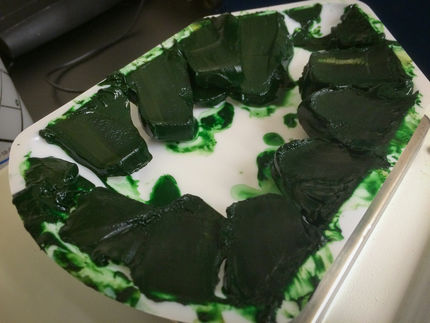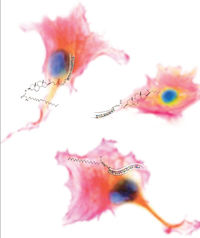Cornell MBA students invest in biomedical start-up to help tissue banks address serious threat to human health
Until now, there has been no way to sterilize human tissue. The potential for a product that can do the job is one reason MBA students at Cornell University's Johnson Graduate School of Management made a savvy investment pick in NovaSterilis, a start-up biotechnology company in Lansing, N.Y., near Cornell.
Severe burns and torn knee ligaments are among the myriad common injuries that require transplants of human skin and bone tissue. But if the transplanted tissue is contaminated it can become infected and fail to "take."
NovaSterilis is commercializing a process developed at Massachusetts
Institute of Technology to make supercritical carbon dioxide -- a
high-pressure and low-temperature form of carbon dioxide (CO2), an
inert natural gas, that has turned out to be ideal for sterilizing
human tissue (see
Recently a nine-member student team that manages BR Ventures (BRV), a venture-capital fund at the Johnson School, invested $40,000 in NovaSterilis. "After a lengthy period of due diligence and research, our team has decided to move forward and invest in this extraordinary company," said Scott Jackson, MBA '06, a current BRV student fund manager.
The need for sterilized tissue is enormous: More than 2 million allografts -- musculoskeletal tissue for grafting -- have been distributed to surgeons for transplants in the United States in the past five years, said David Burns, president and CEO of NovaSterilis.
Currently the company is working to perfect its tissue sterilization technology with member organizations in the American Association of Tissue Banks. "We expanded and optimized the technology to achieve consistent and total inactivation of a wide range of microbes, including bacterial endospores, in less than 60 minutes," said Burns. One of the best aspects of the product: "It is benign, is commonly found in nature and doesn't harm the environment." Indeed, all plants require CO2 and all humans exhale it.
NovaSterilis, whose staff of four includes Cornell graduate Tim Christensen, Ph.D. '02, molecular biology and genetics, will use the BRV funds and other investment monies to bring its product to market. BRV will have an observer seat on the company's board of directors, and the company plans to involve Johnson School students in other ways as well.
Sandeep Kumar, MBA '05, who was part of the student team that made the investment decision, said: "We were looking for three things -- multiple strategies and partners, proven managerial success and a learning opportunity for future Johnson School MBA students." NovaSterilis has partnerships with pharmaceutical and vaccine companies, tissue banks and others; and Burns already had grown another company from a value of $3 million to $30 million in three years, selling it for a substantial profit, and he was very open to student participation, said Kumar.
David BenDaniel, the Don and Margi Berens Professor of Entrepreneurship at the Johnson School and faculty adviser to BRV, said, "The investment gives us a presence in the corporate boardroom so we can participate, particularly from an educational standpoint, in the decisions being made to grow the company and increase shareholder value." The exposure will be invaluable to MBA students interested in working for a venture-capital investment firm, a business start-up or launching their own business, he said.
The start-up company also will benefit, said Jackson. "The diverse backgrounds of the BRV student fund managers make us a terrific resource. We may advise the company on issues it encounters, offer project-specific consulting services, such as marketing strategy, and help introduce the company's managers to other investors."
BRV began at the Johnson School five years ago as a way for its MBA students to gain experience in making venture-capital investment decisions. The students who manage the fund handle all steps of the venture-capital process, including diligently investigating the details of potential investments and negotiating their terms. Investments, which serve as seed capital, range from $25,000 to $100,000. NovaSterilis is BRV's fifth investment. Others have included Medical Care Corporation, which produces early-detection tools for Alzheimer's disease; SightSpeed, which makes high-quality Internet-based videoconferencing software; Gene Network Sciences, a systems biology company; and Nanofluidics, a nanotechnology company.
The BRV fund is supported by donations from alumni and friends of the Johnson School and Cornell. "Donors get a chance to support the university in a new way as well as get an early look at exciting new business ideas," said BenDaniel.


























































